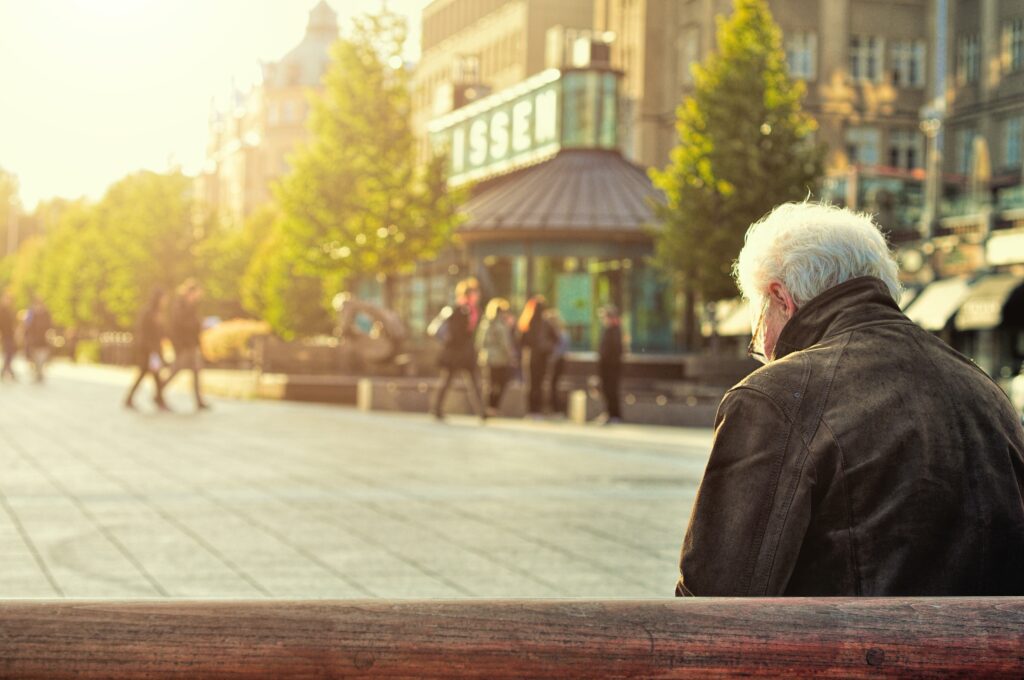By Richard Fleming
July 2023

Photo courtesy of Allison Saeng
When people are fortunate enough to retire, clocks start acting funny. Time becomes more fluid. 8:00 pm is no longer necessarily 8:00 pm. Before retirement, each hour of every day is tied to our work schedule. Free time is limited and precious. Scheduling of all activities, hobbies, family events, even sleeping, is dictated by timetables imposed by work. But when these schedule restrictions recede into the past, time becomes a bit loosey-goosey.
It’s not that retirees live lives of leisure, free of responsibilities. We are still required to babysit grandchildren, clean the house and yard, shop for groceries, cook, and keep up with current events. Our schedules can also fill up with hobbies, volunteer work, political activities, non-political activities, and non-active activities. But the rigidity previously imposed by the ticking clock dissipates and our hours become more flexible.
Looking at how bedtimes change for older people provides insight into shifting circadian rhythms. Working people often hit the sack around 11:00 pm, maybe 12:00 midnight. But for many retirees, including my wife and myself, bedtime moves a couple of hours earlier. Our energy starts to wane in the early evening, and by 9:00 or 10:00 pm the siren call of the mattress becomes irresistible. No matter whether the day was active or slow, it just seems harder to maintain alertness, stamina, and an upright posture at night. For us, 8:00 pm is the new 10:00 pm.
This change in circadian rhythm in the elderly is an interesting phenomenon. Our daily cycles are rooted deeply in biology. Every part of our body runs on a 24-hour clock controlled by a region deep in our brain called the anterior hypothalamus. Through hormonal and neurological signaling, this part of the brain orchestrates a complex daily symphony among our organs, tissues, and metabolism which varies on a 24-hour schedule. The body is pretty cool, right?
This circadian rhythm remains relatively stable for most of our lives, until aging starts to creep in. For reasons not well understood, older people’s 24-hour cycles tend to time-shift, usually moving forward a few hours. As an example, let’s look at an older person living in California like myself. In the evening I may look at our wall clock in Benicia and see it reads 7:00 pm. But my body is winding down and feels as though I was back in my hometown, Topeka, where the clocks read 9:00 pm. (A brief clarifying note for any Gen X or younger folks who have stumbled across this blog – older folks usually have large clocks mounted on our walls at home. We use them to tell time. I understand you probably consider wall clocks anachronistic since you are never separated from your cell phone. But you will come to see the importance of wall clocks, with large numbers, as you grow older.)
When unexplained phenomena occur, such as people’s biological clocks resetting with age, researchers are eager to find answers. It should not be surprising that a group of Swiss scientists decided to study this puzzle. Switzerland, of course, is known for its close attention to watches, clocks, and strict time schedules. A little over ten years ago, researchers at the University of Zurich performed skin biopsies on young and old people and grew the skin cells in culture media. They noted that human skin cells have regular 24-hour cycles for functions like how permeable they are and how fast they grow. Skin cells from young and old people both operate on 24-hour cycles, but the older skin cells’ timer was shifted a few hours earlier. This finding confirmed what we older folks experience in real life. We go to bed early, not because we’re sluggish, but because biology insists we do so.
The researchers discovered another interesting finding. They grew the younger folks’ skin cells in broth containing blood from older people. What happened? The young people’s skin cells shifted their circadian rhythm clocks to match those of older people. Some factor in older folks’ blood forced young people’s skin to reset their daily clock to match that of older folks.
The question of why this phenomenon takes place is not yet answered, but I suspect it is due to evolutionary selection. There just isn’t, and never has been, a lot to keep older folks occupied and busy at night. We don’t party much. We don’t spend a lot of time on late night entertainment options. So why not catch some Z’s? We seniors have no reason to feel guilty about heading towards our bedrooms at 10:00 pm. The Swiss have proven it is due to our biological clocks. We can pin the responsibility on our anterior hypothalamus.
In closing I will note there is a very weird, unexplained phenomenon which characterizes some seniors. For a small proportion of retirees, their clocks reset in the opposite direction. They stay up much later than they did when working. Bedtime no longer comes at 11:00 or 12:00 pm, but instead at 1:00 or 2:00 am. Morning alarms become extinct. For them, awakening at 10:00 am or later is no cause for embarrassment. Actually they view it as a badge of honor. The explanation for this peculiar lifestyle is as yet unknown. If any research turns up answers, I will post the findings.
* * *
If you enjoyed this post, please consider subscribing to be notified of future posts. Subscriptions are free.
